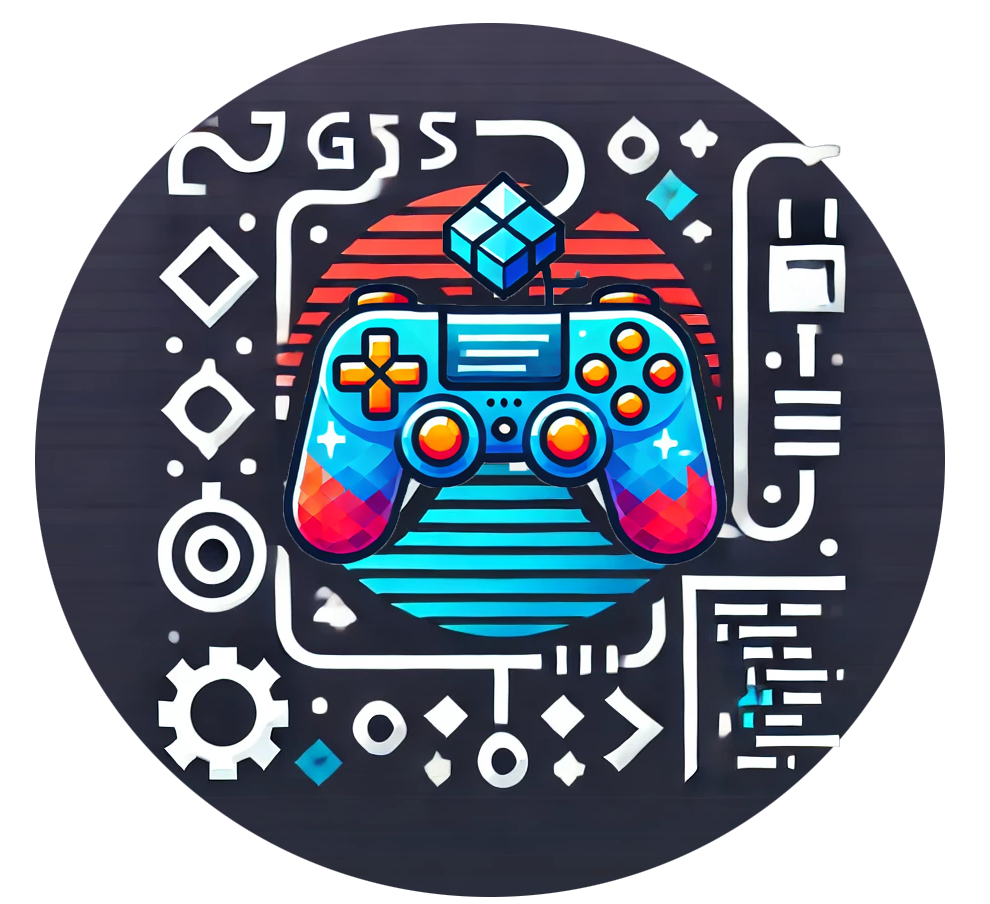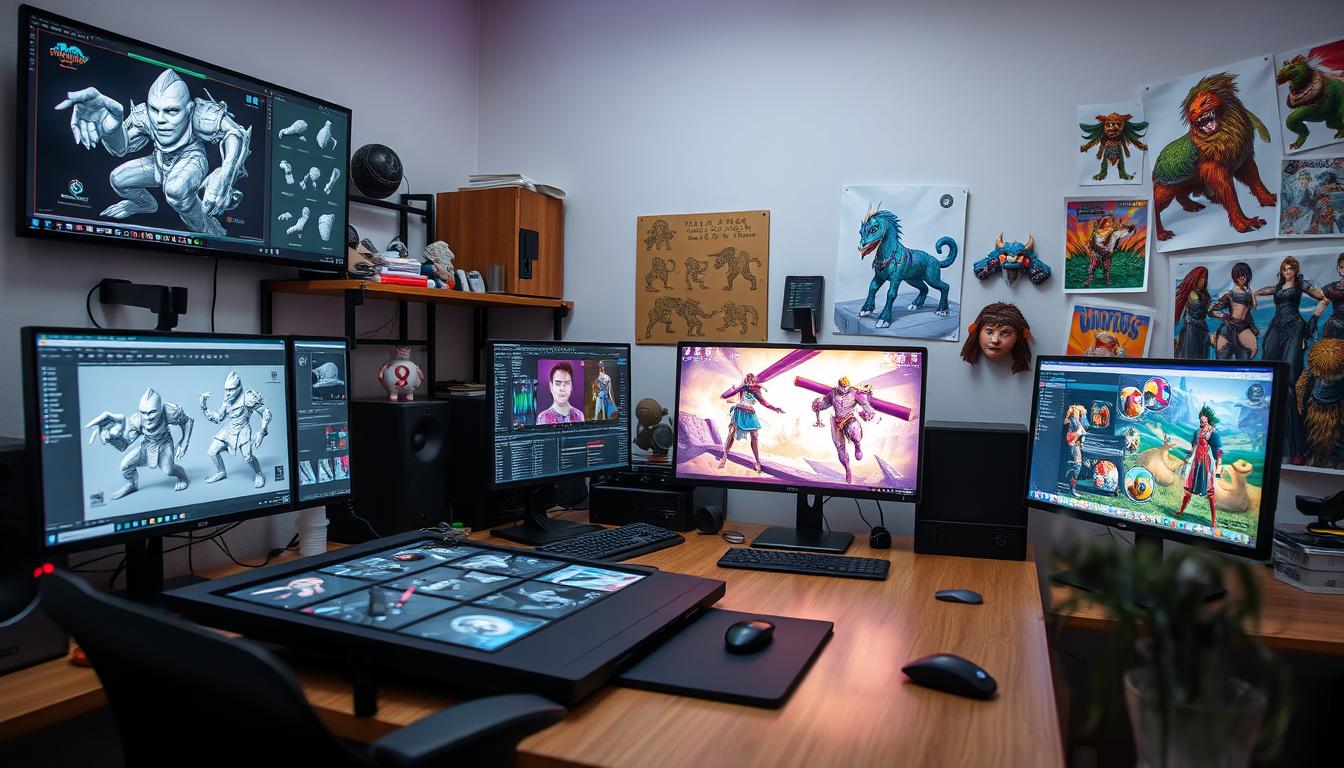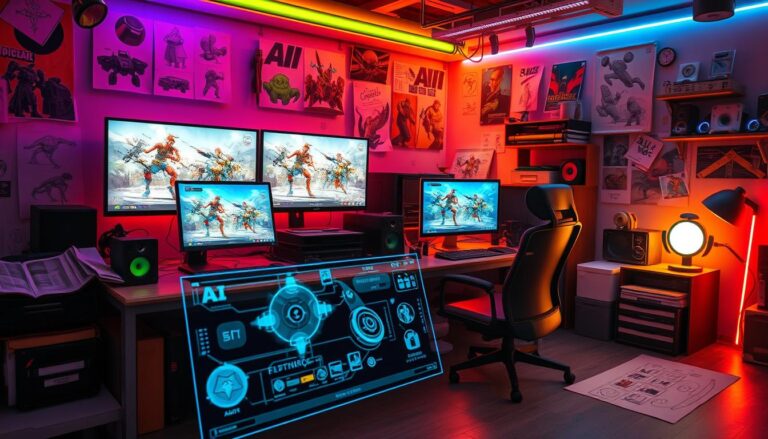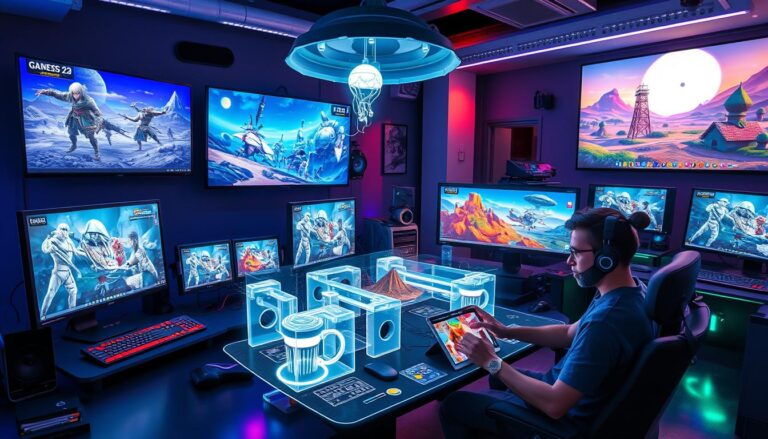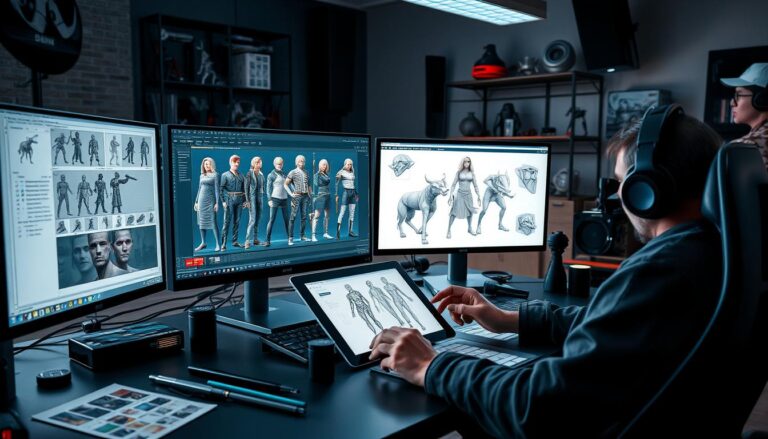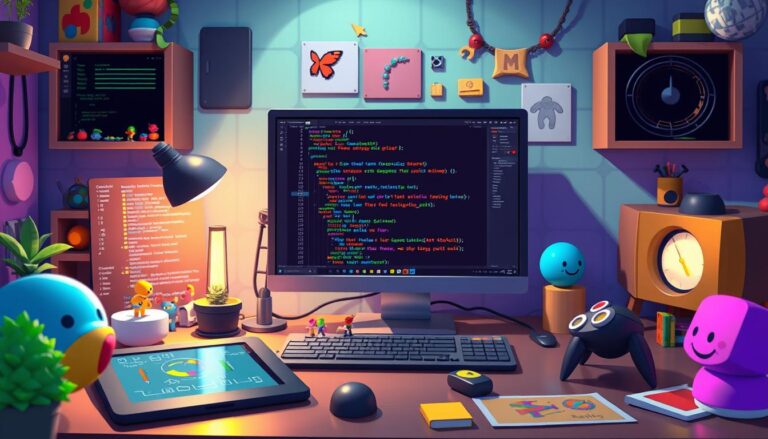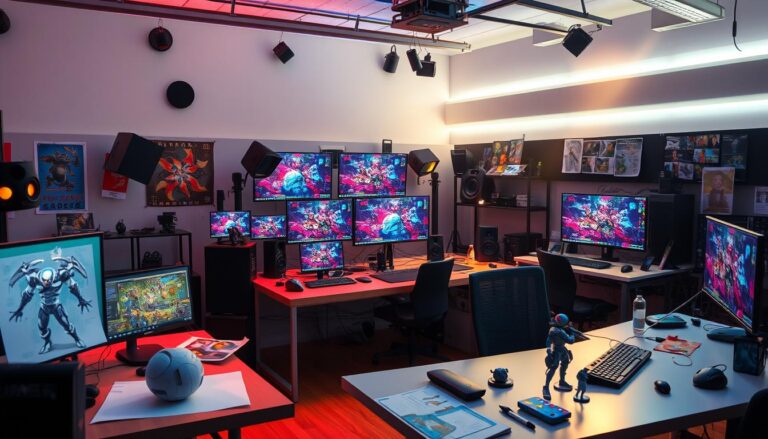What Skills Are Essential for 3D Game Development?
The world of 3D game development is always changing. It needs a wide range of skills to make games that are fun and real. Aspiring game designers must learn many things to succeed in this exciting field.
At the heart of 3D game development is knowing how to design games that are fun. Designers must break down complex systems, analyze data, and share their ideas with teams. They also need to know how to create 3D art and design levels to make the game world come alive.
Game designers must also understand the technical side of game development. They need to know how to use game engines, program, and write scripts. Tools like Unity, Unreal Engine, and Godot help bring games to life. Skills in programming, data types, and math are key for realistic game physics and mechanics.
To be a successful 3D game developer, you need a mix of technical and creative skills. You also need soft skills for working well with others and managing projects. By always improving and keeping up with trends, game designers can create amazing experiences for players everywhere.
Core Technical Requirements for Game Creation
To make exciting 3D games, you need strong technical skills. You must know how to program and script, use game engines well, and understand game physics and mathematics.
Programming and Scripting Fundamentals
Knowing programming languages like Python, Lua, and C# is key for game scripting. Beginners can start with Unreal Blueprints, a visual system that makes coding easier. It’s important to grasp object-oriented programming, data types, and logic to create game mechanics.
Game Engine Proficiency
Learning to use top game engines like Unity Engine and Unreal Engine is crucial. These tools offer everything needed for 3D game making, from managing assets to AI. Getting good at these engines is vital for turning game ideas into reality.
Understanding Game Physics and Mathematics
Knowing game physics and math is key for realistic gameplay. Designers need to understand collision detection, force calculations, and 3D vector math. This knowledge helps create natural movements and accurate physics, making games more engaging.
| Requirement | Minimum | Recommended |
|---|---|---|
| RAM | 4 GB | 16 GB |
| Storage | 256 GB | 500 GB NVMe + 1-2 TB NVMe |
| Processor | Intel Core i5 | AMD Threadripper 7000 Series |
| Graphics Card | Dedicated GPU with 4 GB VRAM | NVIDIA GeForce RTX 4090 |
| Resolution | 1920 x 1080 | 2560 x 1440 or higher |
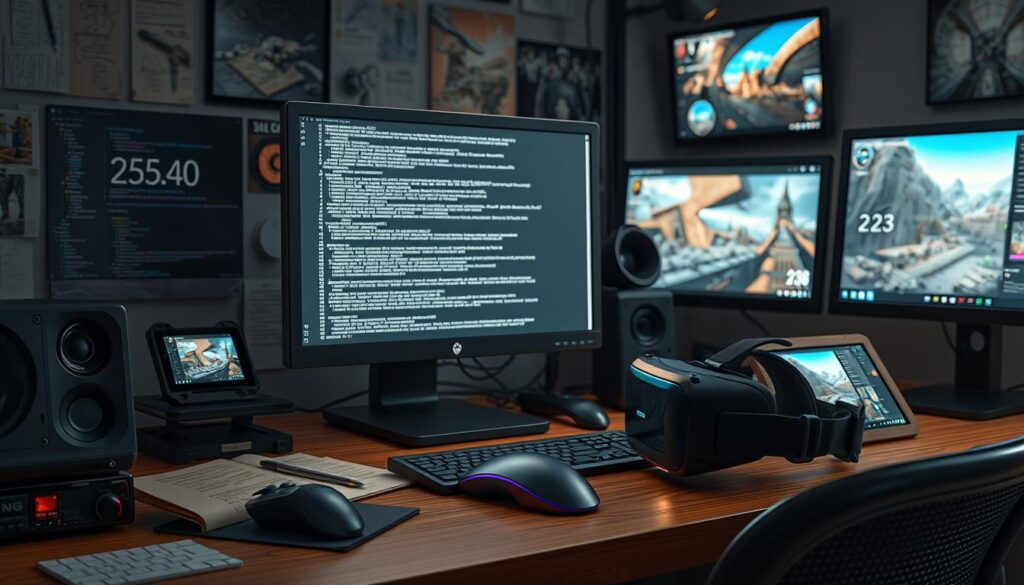
Artistic Skills and Visual Design Elements
Creating a game world that draws players in is key in 3D game development. Skills in rendering, character animation, and game asset creation are vital. They help developers share their ideas and make games that players love.
Knowing how to use 2D art tools like Adobe Photoshop and Illustrator is crucial. Game designers use these tools to make mockups, UI/UX flows, and level drawings. This helps them plan the game’s look before starting on the 3D part.
Level designers need a good eye for how things look in the game. They focus on where to place assets, how to light them, and how to create a great atmosphere. Their work makes the game world feel real and engaging.
Having artistic skills can make a game developer better at creating stunning 3D games. Working together with artists and developers is key. It helps make sure the game looks and feels just right.
| Artistic Skill | Application in Game Development |
|---|---|
| Art Direction | Establishing the overall aesthetic and visual style of the game |
| Illustration | Creating concept art, character designs, and environmental sketches |
| 3D Modeling | Designing and building 3D assets, props, and environmental elements |
| Animation | Bringing characters and objects to life through fluid and expressive movements |
| UI/UX Design | Crafting intuitive and visually appealing user interfaces and experiences |
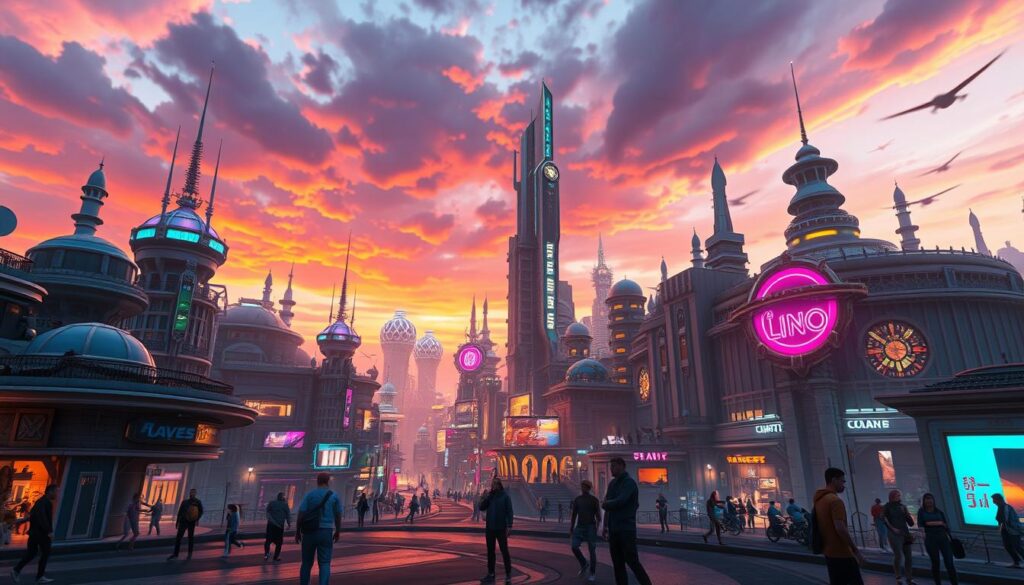
3D Game Development Tools and Technologies
Knowing the top software is key for 3D game making. Maya, Blender, and 3ds Max are top picks for modeling, texturing, and animation. For 3D sculpting, ZBrush or similar tools are a must. Unity Engine and Unreal Engine are the main platforms for making games and adding assets.
Inside these engines, special tools help build game worlds and plan gameplay. Good asset management is crucial for keeping game resources like models, textures, and sounds in order. Knowing how to use version control and project management tools also helps a lot in making games.
Industry-Standard Software Mastery
The 3D Models market grew to USD 1255.8 million in 2022. It’s expected to grow by 19.04% each year until 2028, reaching USD 3573.08 million. This growth shows how important it is to know top software like Maya, 3DS Max, and Blender for game developers.
Asset Creation and Management
The 3D game production market is growing fast, with a CAGR of 19.04%. By 2028, it’s expected to hit USD 3573.08 million. To keep up, developers need to get good at making assets and managing them well. This means organizing and optimizing game resources like models, textures, and sounds.
Level Design and World Building
Modern games have millions of polygons for detailed graphics. Engines like Unreal Engine, Unity Engine, and CryEngine offer powerful tools for designing game worlds. These tools help developers create engaging and beautiful game environments that meet player expectations.
Essential Soft Skills for Game Developers
Technical skills are key in game development, but soft skills are just as important. Good communication helps team members work together and share ideas. As teams grow, project management skills become crucial for planning, organizing, and meeting deadlines.
Problem-solving abilities, adaptability, and creativity are vital for facing development hurdles. Being able to give and receive constructive feedback is key for improving game quality. In a fast-changing industry, continuous learning and keeping up with trends are essential to stay competitive.
- Effective communication skills for team collaboration and idea-sharing
- Project management expertise for task prioritization, resource allocation, and timeline management
- Problem-solving abilities to tackle development challenges
- Adaptability to embrace change and learn new technologies
- Creativity to develop innovative game concepts and solutions
- Constructive feedback skills to enhance game quality
- Continuous learning to stay ahead of industry trends
By improving these soft skills, game developers can enhance their communication skills and project management. This gives them an edge in the fast-paced world of game development.
Conclusion
Creating successful 3D games needs a mix of skills. You need technical know-how, artistic flair, and soft skills. To start, you must learn programming, get good at game engines, and understand visual design.
The gaming world keeps changing. To succeed, you must keep up with new tech, like virtual reality. This is key for a lasting career in 3D game development.
Tools like Unity, Unreal Engine, and Godot have changed the game development scene. They offer powerful platforms for making 2D and 3D games on many devices. These engines make it easier to turn your ideas into reality.
To really shine in 3D game development, keep learning, practice hard, and know the industry well. Focus on programming, design, and soft skills. This way, you’ll be ready for a fulfilling career in the growing 3D game development field.
